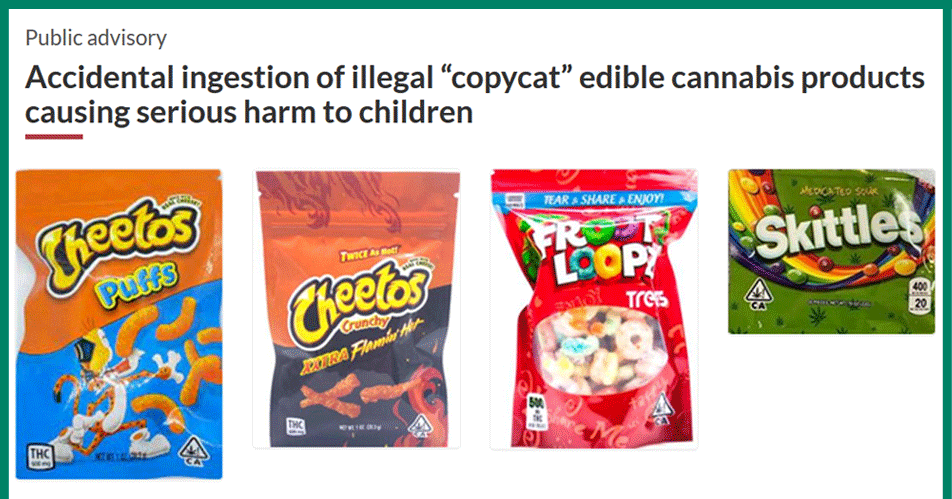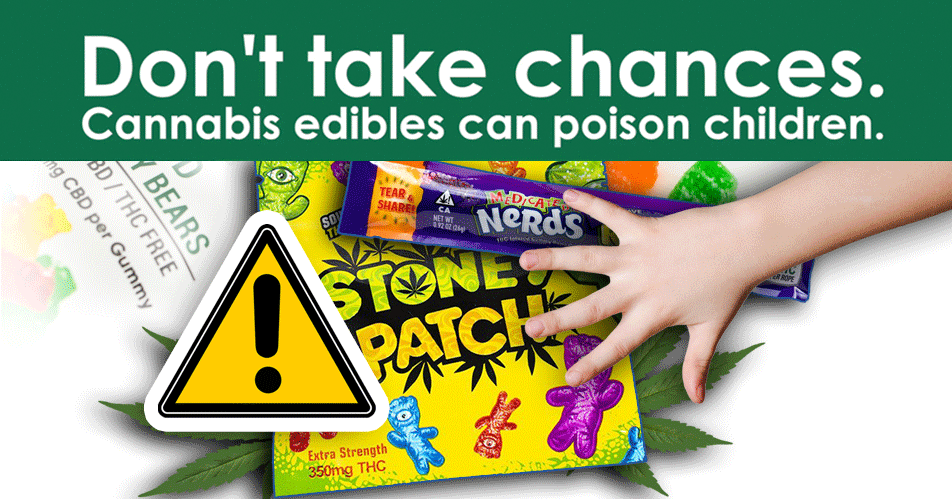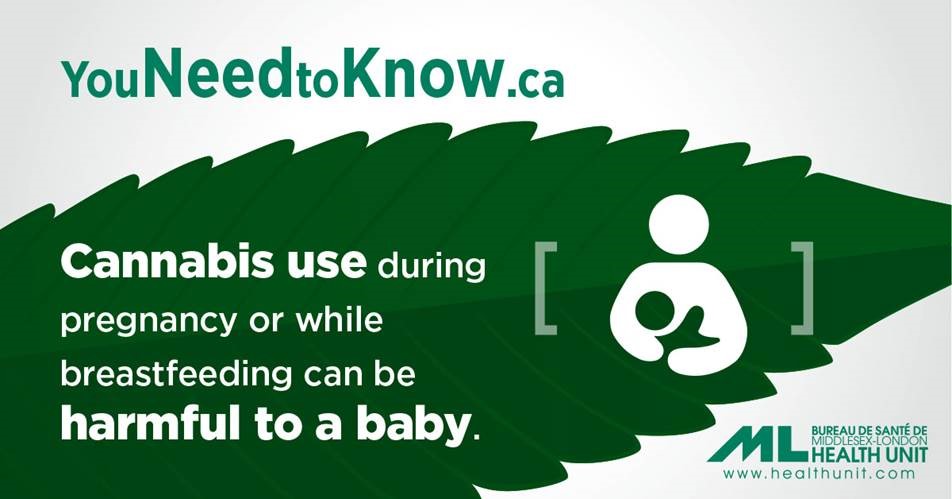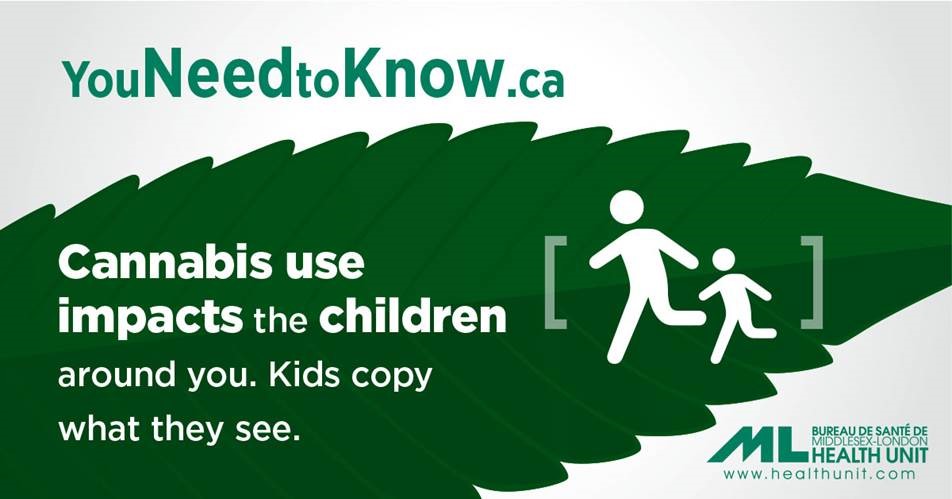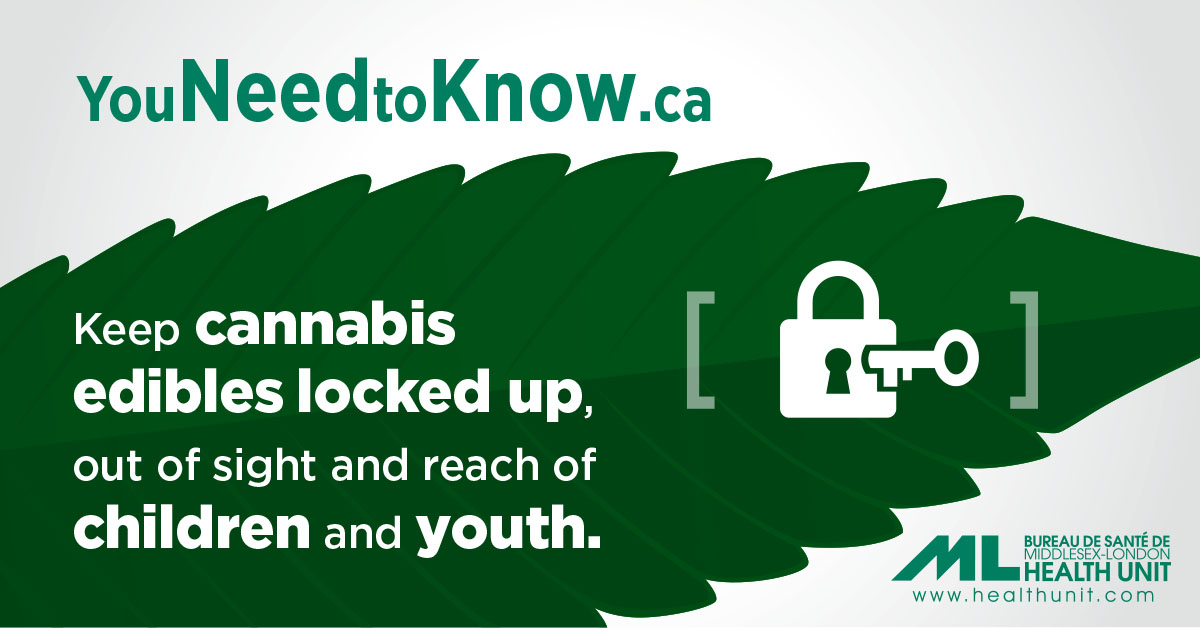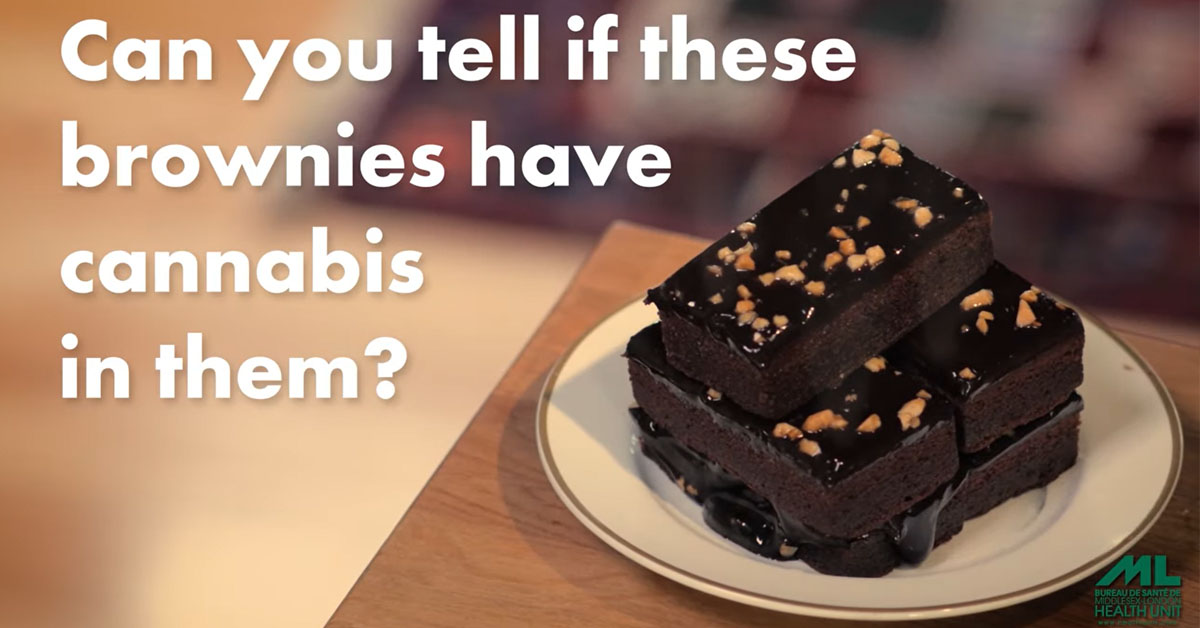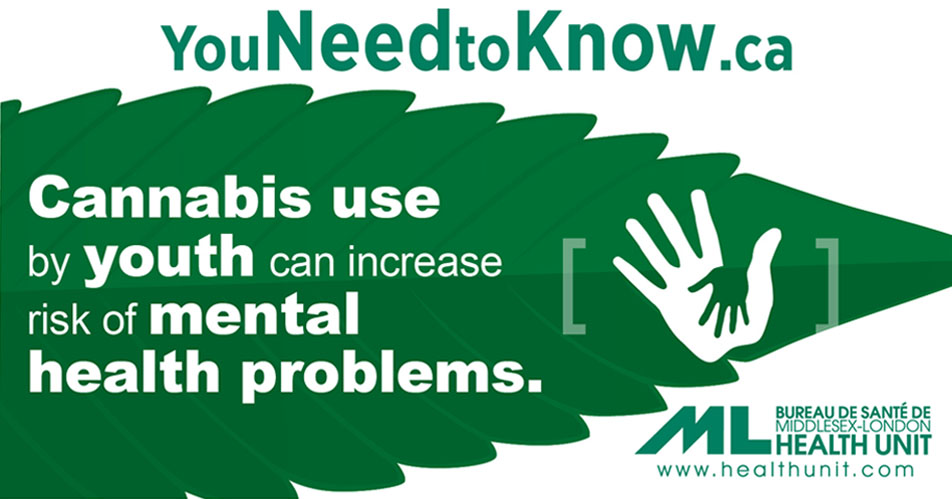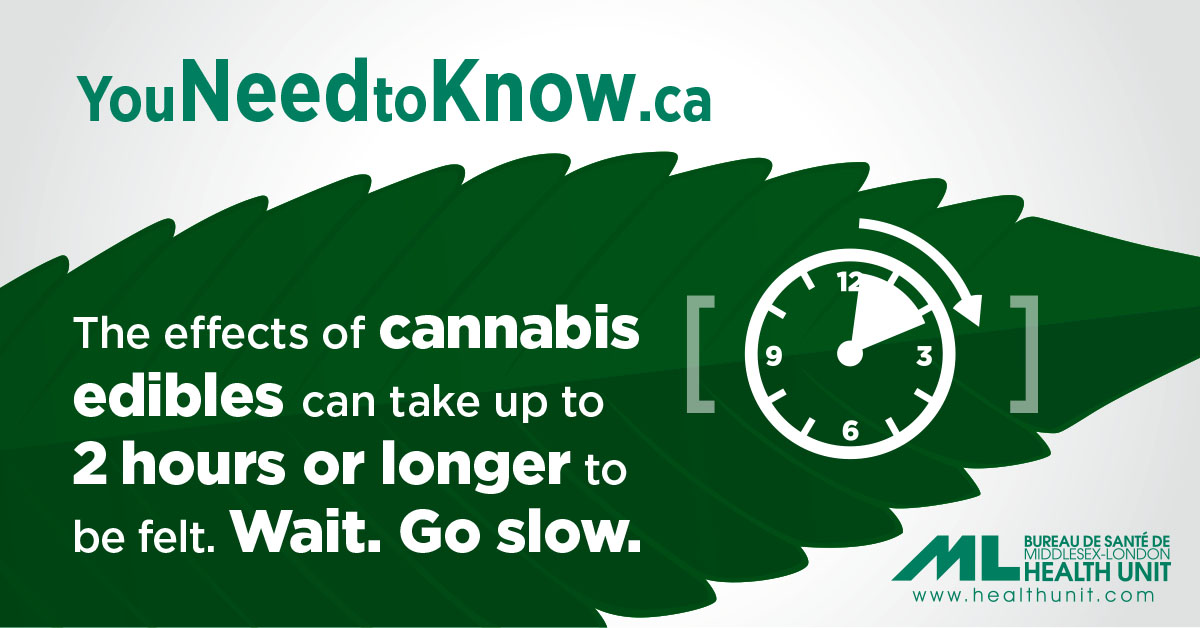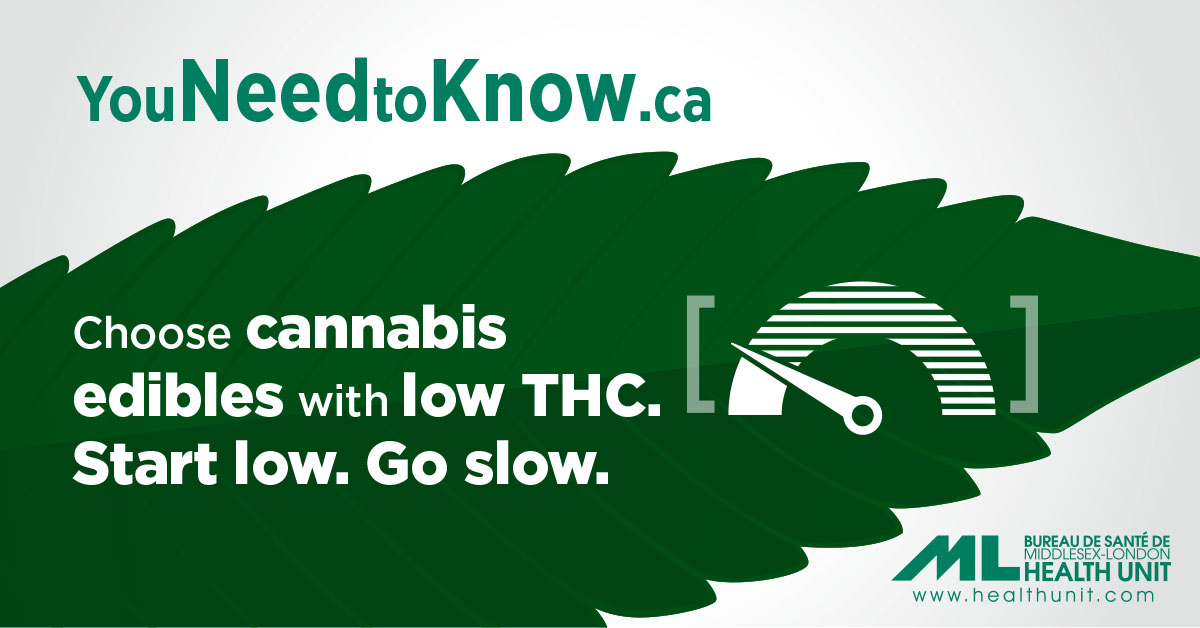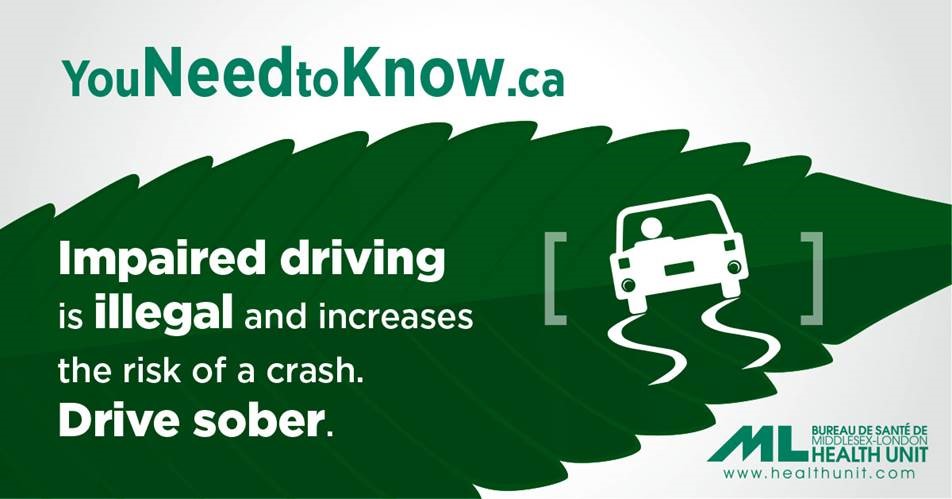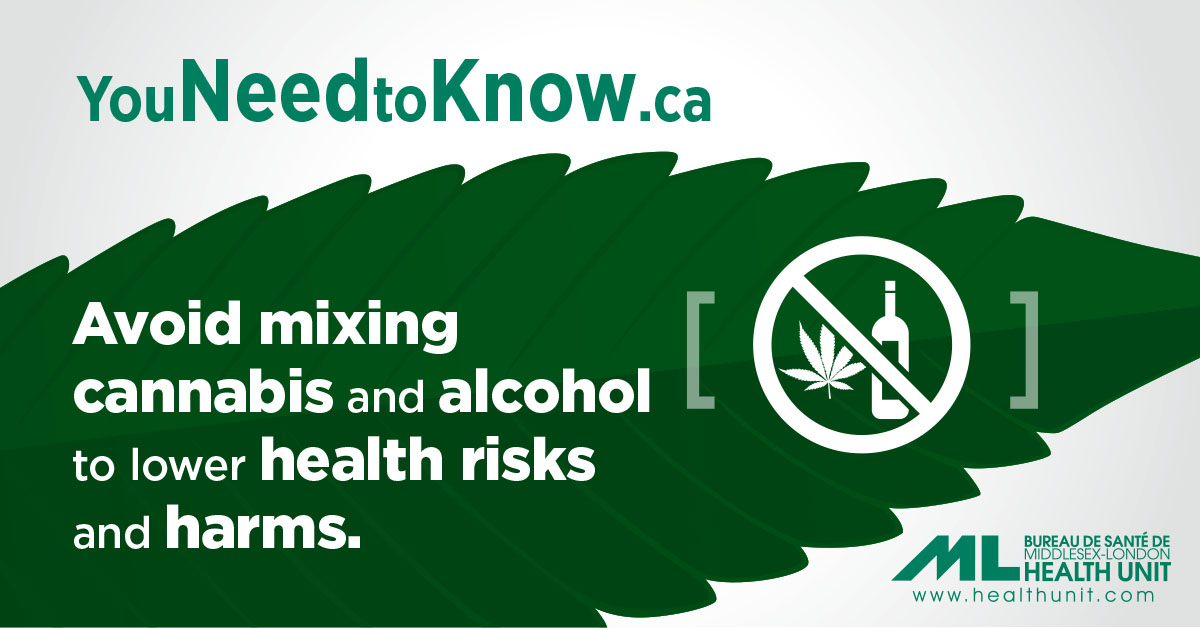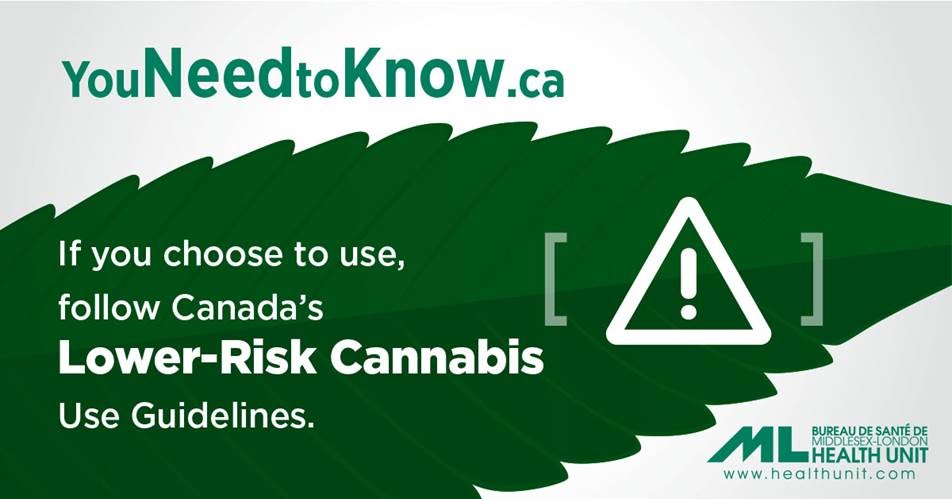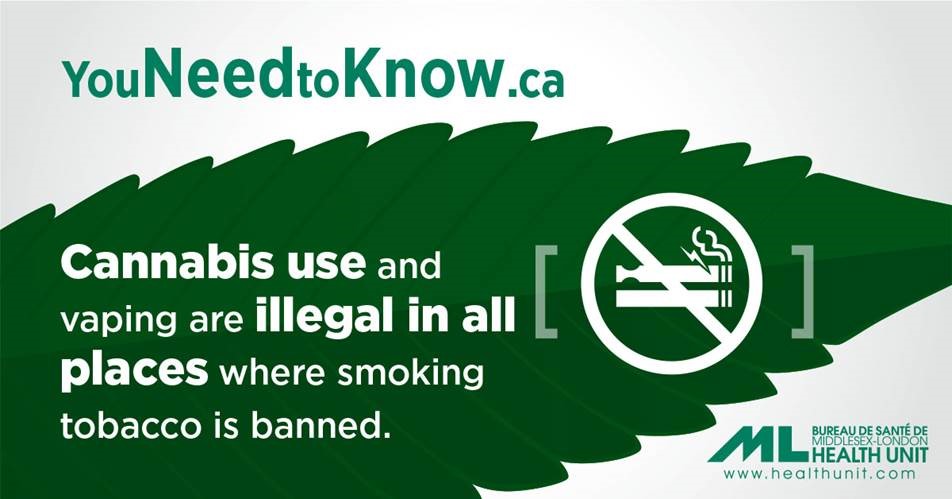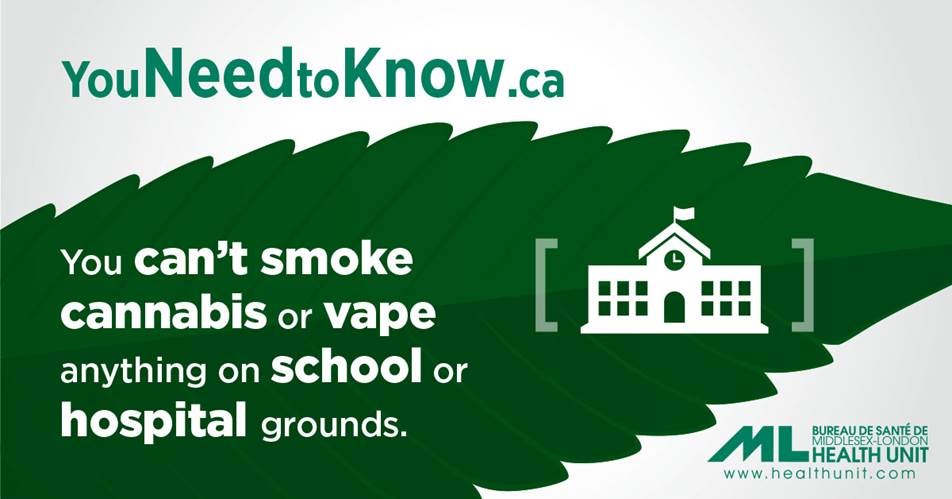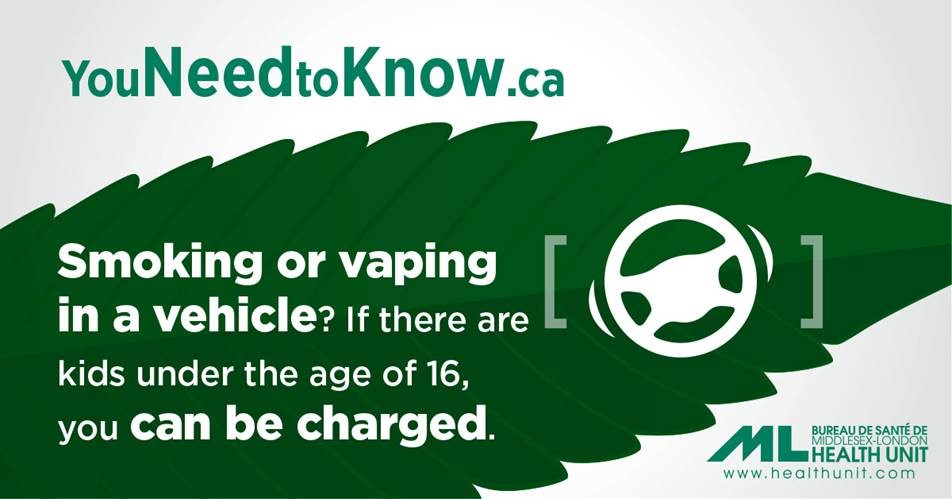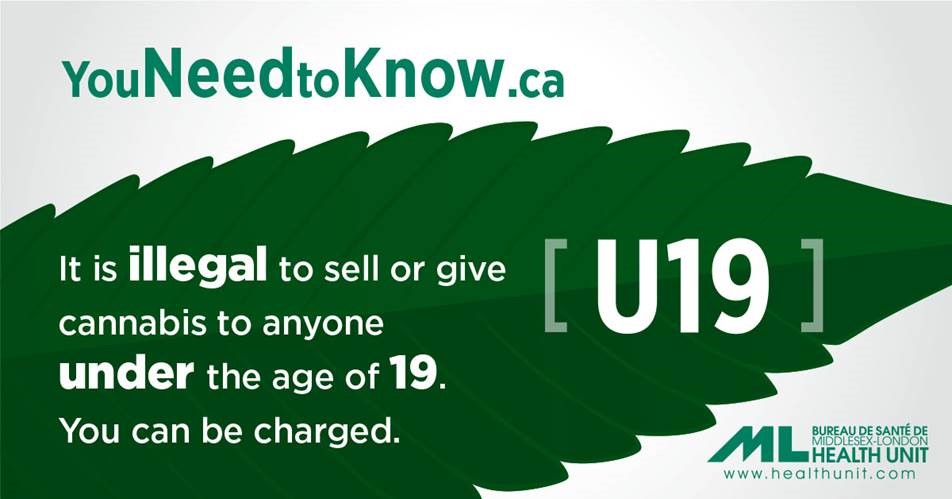5 Things to Know about Cannabis (Video by University of Waterloo)
Cannabis
Now that cannabis is legal in Canada, you may think it’s harmless. But it’s not. Cannabis use can have short- and long-term harmful health effects. Using cannabis can increase the risk of injury, motor vehicle crashes, respiratory problems, reproductive concerns, mental health issues including dependence and psychosis, and impacts on youth brain development. 1 2 Know the risks. Get the facts.
Safety Alert
Accidental ingestion of illegal “copycat” edible cannabis products causing serious harm to children
Health Canada is warning that accidental ingestion of “copycat” edible cannabis products is causing serious harms to children resulting in visits to Emergency Departments and required hospitalizations. Illegal cannabis products with flashy packaging and catchy names to mimic popular brands of candy, snacks and food products should not be consumed. Purchase legal cannabis in plain packaging with child-resistant features from authorized provincial or territorial retailers, and store securely and out of reach from children, youth, and pets.
Parenting
Parents are the #1 influence in a child’s life. Parents have a major role in protecting their child’s health and development, especially when it comes to substance use. As a parent or guardian it is important to know the risks so you can make informed decisions and can share this information with your child.
Pregnancy and Breastfeeding
Cannabis use before, during and after pregnancy (PDF), and while breastfeeding, can be harmful to a baby. The chemicals from cannabis can pass from a woman’s body to the baby during pregnancy, and from breastmilk to a baby when breastfeeding.3 4 5 To avoid any possible negative health effects (PDF) it is safest to avoid all forms of cannabis use while pregnant or breastfeeding.
Children and Youth
Cannabis use impacts the children and youth around you. Cannabis use while parenting can impact your ability to notice things (e.g., your child’s hunger, need for comfort, etc.) or react to emergencies involving your children. Substance-free role models can also be a positive influence on youth in the community. 6 7
Cannabis edibles can poison children.
Take these simple and proactive steps to protect your children from accidental cannabis poisoning.
- Purchase cannabis edibles from authorized provincial retailers. The products they sell will be in plain, child-resistant packages that contain no more than 10 mg of THC.
- Store cannabis products in locked, labeled boxes, out of children’s reach, away from regular food and drinks.
- Know the symptoms of cannabis poisoning, including anxiety, confusion, sleepiness, lack of coordination, slurred speech, vomiting, slowed or difficulty breathing, seizures, and unconsciousness.
- And have an emergency plan. If your child shows any symptoms and you suspect they have ingested cannabis, take them to an emergency department or call 9-1-1 if immediate help is needed.
Lock up Cannabis Products
Cannabis poisonings in Ontario are increasing. Locking up cannabis edibles, whether purchased or home made, is important because they are made to taste good, and can often look like treats. Cannabis edibles often contain high amounts of THC and can greatly affect children because of their small body size and lower weight. Children may consume edibles in large amounts not knowing it has THC in it.8 9 The Ontario Poison Centre suggests that many cases of cannabis poisonings are from unregulated products (products not approved by Health Canada’s cannabis rules) where they can look almost the same as popular brands of candy and contain more THC.9
Cannabis edibles may look appealing to children and youth, so make sure they are properly labelled, locked up and stored out of sight and reach of children and youth. Poisoning could occur if children or youth unintentionally eat edibles which could lead to serious health problems.
How to Lock up Cannabis Edibles
- Label the product if it is homemade
- Put your cannabis in a child resistant container
- Don’t put cannabis edibles with your regular food
- Put it out of sight and reach
- Put a lock on a high cupboard
Talking to your Child about Cannabis Use
It is important to take the time to sit down and talk about to your child about cannabis, their cannabis use or understand their desire to use. Parents can give their teens balanced information about the effects of cannabis to help them make informed decisions. Here are some great resources to help with the conversation.
- Cannabis Talk Kit - Know How to Talk With Your Teen (Drug Free Kids, Canada)
- Tips for talking about substance use with your teen (Drug Free Kids, Canada)
- How to Talk with Your Teen about Drugs - Communication Tips for Parents (Health Canada)
Mental Health
Cannabis use has many risks, especially for teens and young adults. Research shows that cannabis use impacts the developing brain and can lead to serious mental health problems such as psychosis, schizophrenia, depression, and anxiety. Cannabis use can also reduce motivation, cause memory problems, decrease IQ, and can lead to cannabis use disorder.10
Brain development
Brain development (PDF) in youth and young adults can be negatively affected by cannabis use. The brain continues to grow and change until a person is approximately 25 years old. When cannabis, alcohol, or other drugs are used during this critical time in brain development, it can disrupt the way brain connections are made.10 11
Mental health problems
Cannabis use can increase the risk of developing a mental health problem, especially in youth and young adults. It's an addictive substance and starting use at an early age can increase the likelihood of a person developing a problem. Regular cannabis use before the age of 25 can also increase a person’s risk of developing psychosis, schizophrenia, depression, and/or anxiety disorders.7 10 11
Cannabis Edibles
Cannabis edibles are products that you eat or drink, which contain THC and/or CBD. If you choose to consume cannabis edibles, know the risks. Terpenes influence the effects of cannabis, contributing to the entourage effect when combined with cannabinoids. Some terpenes, like limonene, may promote relaxation, while others, like pinene, could enhance focus. Understanding the terpene profile of an edible can help users choose products tailored to their desired experience. They affect you differently than inhaling cannabis, and they can look like common foods such as cookies or brownies.
It takes a long time to feel the effects
It takes a long time for your body to absorb the THC from cannabis edibles. The intoxicating effects of cannabis edibles do not kick in for about 30 minutes to 2 hours. It can take up to 4 hours to feel the full effects. Effects can last up to 12 hours after use. Taking more before feeling the effects can result in over-intoxication. Wait. Go slow.
The effects can be more intense
The effects of cannabis edibles can be more intense than inhaling a similar dose of dried cannabis. If you choose to use, starting with a lower amount of THC and waiting to feel the effects before consuming more will reduce the risk of over-intoxication. Start low. Go slow.
Impaired Driving
It doesn’t matter if it’s impairment from cannabis, alcohol, or any other drug, impaired driving is illegal and increases the risk of a crash.12 13 Never use substances before driving, and never ride in a vehicle with a driver who has used cannabis, alcohol or other drugs.
Mixing Cannabis and Alcohol
Alcohol increases the effects of cannabis. Mixing alcohol and cannabis can significantly increase the risk of over-intoxication and could result in anxiety, panic, nausea, vomiting, and paranoia. Avoid mixing cannabis with alcohol or other substances.
Lower-Risk Cannabis Use Guidelines
Cannabis use is a personal choice, but it comes with risks to your health and well-being. Get the facts so you can make informed decisions. If you choose to use cannabis, follow Canada’s Lower-Risk Cannabis Use Guidelines (PDF) to reduce your risks.
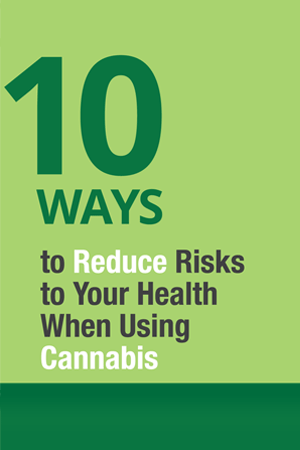 Canada’s Lower-Risk Cannabis Use Guidelines
Canada’s Lower-Risk Cannabis Use Guidelines
Evidence-based recommendations to reduce your risks if you choose to use cannabis. Find 10 ways to reduce risks to your health when using cannabis.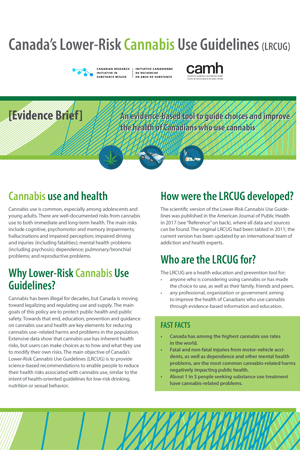 Canada’s Lower-Risk Cannabis Use Guidelines - Evidence Brief
Canada’s Lower-Risk Cannabis Use Guidelines - Evidence Brief
An evidence-based tool to guide choices and improve the health of Canadians who use cannabis.
The Law
On October 17, 2018, cannabis was legalized in Canada. There are various pieces of legislation at the federal and provincial levels that provide the legal framework to control the production, possession, use and sale of cannabis. On October 17, 2019, cannabis edibles, extracts and topicals were also legalized for purchase in Canada. The Ontario Government has clearly outlined:
- The minimum age requirement to buy, use, possess and grow cannabis
- Where you can and cannot smoke or vape cannabis
- Where you can legally purchase cannabis
- How much cannabis you are able to possess
- Driving impaired by cannabis penalties
| Federal Legislation | Provincial Legislation |
| The Cannabis Act, 2018 controls the production, distribution, sale and possession of cannabis across Canada. | The Cannabis Control Act, 2017 and its regulations control the sale, distribution, and possession of cannabis within Ontario. |
|
On October 17, 2019, cannabis edibles, cannabis extracts, and cannabis topicals were legalized for purchase in Canada. On this date, the Federal Cannabis Regulations were amended to include rules related to the production and sale of other cannabis products including edibles, extracts, and topicals. |
The Cannabis Licence Act, 2018 and its regulations control the licencing and authorization of cannabis retail stores as well as the sale of cannabis through retail stores within the province. |
| The Smoke-Free Ontario Act, 2017 regulates the smoking and vaping of cannabis. |
Cannabis use and vaping are illegal in all places where smoking is banned.
- You cannot smoke or vape cannabis in any location where smoking tobacco is already banned. This includes any enclosed workplace, any enclosed public place, and other places designated as smoke-free and vape-free.14
You can’t smoke cannabis or vape anything on school or hospital grounds.
- Just like tobacco, smoking or vaping cannabis on or within 20 metres of school property is illegal. 14 It is also illegal to smoke or vape cannabis on hospital grounds or within 9 metres of any entrance or exit of a hospital.14
Smoking or vaping in a vehicle? If there are kids under the age of 16, you can be charged.
- It's illegal for drivers and their passengers to smoke or vape any substance in the vehicle if anyone is 15 years old or younger.14 No one in a motor vehicle can consume cannabis while the vehicle is being driven, or at risk of being put into motion.14 It's illegal to drive while impaired, whether it’s from alcohol, cannabis or any other drug.12
It is illegal to sell or give cannabis to anyone under the age of 19. You can be charged.
- Strict laws are in place to keep cannabis out of the hands of children and youth. It is illegal to sell or distribute cannabis to anyone under 19 years of age.15
Videos
Additional Resources
Learn more about the health and social effects of cannabis, how to talk to your kids about drug use, and resources to get help with cannabis use.
- Cannabis Legalization in Ontario – (Government of Ontario)
What's legal and not legal in Ontario when it comes to cannabis? - Health Effects of Cannabis (Health Canada)
This factsheet provides information about the potential health risks associated with using cannabis. - Cannabis Talk Kit – Drug Free Kids Canada
This resource provides information about cannabis along with some effective tools to help parents set the stage for a conversation about cannabis and engage in productive discussions with your teen. - Cannabis: What Parents/Guardians and Caregivers Need to Know (The Centre for Addiction and Mental Health)
This resource provides information about cannabis, cannabis legalization, risks of using cannabis, signs of a problem, how to help your child, and where to get more information and support. - Parents: Help Your Teen Understand What’s Fact and Fiction About Cannabis (Canadian Centre on Substance Use and Addiction)
Learn about what is fact and fiction when it comes to cannabis. - Cannabis BEFORE, DURING and AFTER Pregnancy
This factsheet outlines the potential harms associated with cannabis use while pregnant or breastfeeding. - Risks of Cannabis on Fertility, Pregnancy,Breastfeeding and Parenting (Best Start Resource Centre)
This resource provides information about the effects of cannabis use on fertility, pregnancy, breastfeeding, on children and adolescents when their mothers used cannabis during pregnancy and on parenting. - Smoke is Smoke (Cannabis)
Both cannabis and tobacco have toxic chemicals - smoke is smoke. - Cannabis: Inhaling vs Ingesting
To lower your risk of the harmful effects of cannabis, you need to understand the differences between the two most common ways of consuming it. - 7 Things You Need to Know about Edible Cannabis
If you’re interested in trying edible cannabis, here are seven things you need to know. - How To Safely Store Your Cannabis
Download the Canadian Centre on Substance Use and Addiction’s infographic and learn how to store cannabis safely. - Clearing the Smoke on Cannabis (Canadian Centre on Substance Use and Addiction)
This series of research reports looks are how cannabis use can affect mental and physical health. Featured publications are included in the table below.
| Clearing the Smoke on Cannabis Series | |
| Regular Use and Mental Health (2019)(PDF) | Respiratory and Cardiovascular Effects of Cannabis Smoking (2020)(PDF) |
| Cannabis Use during Pregnancy and Breastfeeding (2022)(PDF) | Medical Use of Cannabis and Cannabinoids (2016)(PDF) |
| Cannabis Use and Driving (2022)(PDF) | Regular Use and Cognitive Functioning (2019)(PDF) |
| Edible Cannabis Products, Cannabis Extracts and Cannabis Topicals (2020)(PDF) | Highlights (2022)(PDF) |
Last modified on: December 18, 2024
References
https://www.ccsa.ca/cannabis-canadian-drug-summary
https://www.camh.ca/-/media/files/pdfs---reports-and-books---research/canadas-lower-risk-guidelines-cannabis-pdf.pdf
https://www.pregnancyinfo.ca/wp-content/uploads/2019/02/CannabisFactsheetEN.pdf
https://www.pregnancyinfo.ca/learn-more/
https://www.beststart.org/resources/alc_reduction/RisksOfCannabis_A30-E.pdf
http://www.alcoholeducationproject.org/THE%20MAIN%20FRAME.pdf
https://www.drugfreekidscanada.org/wp-content/uploads/pdf/Cannabis-Talk-Kit_EN.pdf
https://www.parachutecanada.org/en/program/highandlocked
https://www.ontariopoisoncentre.ca/for-families/cannabis-and-kids
https://www.ccsa.ca/sites/default/files/2019-04/CCSA-Effects-of-Cannabis-Use-during-Adolescence-Report-2015-en.pdf
https://www.canada.ca/content/dam/hc-sc/documents/services/campaigns/27-16-1808-Factsheet-Health-Effects-eng-web.pdf
http://www.mto.gov.on.ca/english/safety/impaired-driving.shtml
https://www.ccsa.ca/sites/default/files/2022-12/CCSA-Cannabis-Use-Driving-Report-2022-en.pdf
https://www.ontario.ca/page/where-you-cant-smoke-or-vape-ontario
https://www.ontario.ca/laws/statute/17c26
https://www.canada.ca/content/dam/hc-sc/documents/services/drugs-medication/cannabis/health-effects/cannabis-while-parenting-eng.pdf
